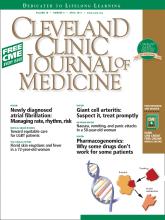Index by author
April 01, 2011; Volume 78,Issue 4
Sadee, Wolfgang
- You have accessPharmacogenomic testing: Relevance in medical practiceJoseph P. Kitzmiller, MD, PhD, David K. Groen, MD, Mitch A. Phelps, PhD and Wolfgang Sadee, Dr rer natCleveland Clinic Journal of Medicine April 2011, 78 (4) 243-257; DOI: https://doi.org/10.3949/ccjm.78a.10145
Knowing their patients’ genetic status, physicians could predict their response to certain drugs, such as clopidogrel (Plavix), warfarin (Coumadin), tamoxifen (Nolvadex), codeine, and psychotropic medications.
Teng, Kathryn
- You have accessPharmacogenomics for the primary care provider: Why should we care?Kathryn Teng, MDCleveland Clinic Journal of Medicine April 2011, 78 (4) 241-242; DOI: https://doi.org/10.3949/ccjm.78a.11017
Personalized medicine promises to improve the quality and lower the cost of care if physicians integrate into practice useful new findings, such as information gleaned from pharmacogenomic testing.
Tziotzios, Christos
- You have accessLeukemia cutisChristos Tziotzios, BA, MA, MB, BChir (Cantab) and Areti Makrygeorgou, MDCleveland Clinic Journal of Medicine April 2011, 78 (4) 226-227; DOI: https://doi.org/10.3949/ccjm.78a.10127
This condition occurs in 10% to 15% of patients with acute myeloid leukemia and is a poor prognostic sign.
Villa-forte, Alexandra
- You have accessGiant cell arteritis: Suspect it, treat it promptlyAlexandra Villa-Forte, MD, MPHCleveland Clinic Journal of Medicine April 2011, 78 (4) 265-270; DOI: https://doi.org/10.3949/ccjm.78a.10131
Giant cell arteritis is the most common form of vasculitis affecting older people. Physicians should be familiar with its variety of clinical presentations.




